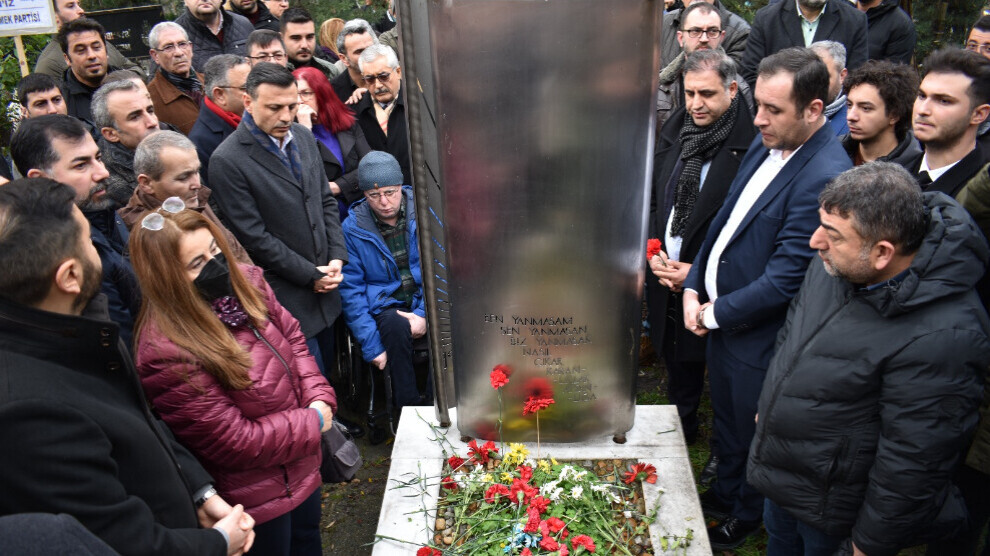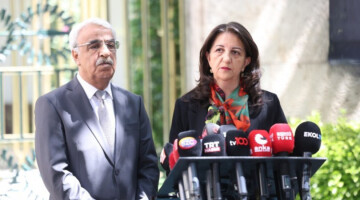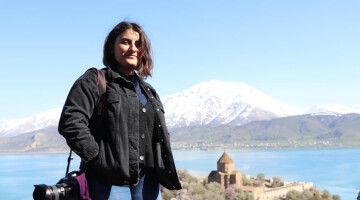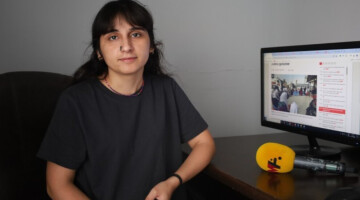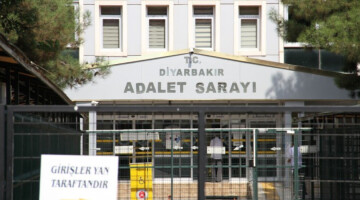Journalist Metin Göktepe, an Alevi Kurd from Sivas, dealt with the country's hushed-up problems, such as the resistance in the prisons or the struggle for survival in the slums of Istanbul, and accompanied the Saturday Mothers' vigils, which still gather every week in Galatasaray Square to draw attention to the fate of their relatives murdered by death squads or "disappeared" in prison.
Göktepe had gone to the Alibeyköy Cemetery on 8 January 1996 to cover the funeral of two leftist inmates, Rıza Boybaş and Orhan Özen, who had been beaten to death during prison riots in the Ümraniye Prison in Istanbul on 4 January. He was detained by police who blockaded the region. Göktepe was beaten and taken to the Eyüp Closed Sports Hall. He was kept at the sports hall for a while, reportedly felt sick there, and was then taken somewhere else by the police.
An unknown person, who was detained and then released, called the Evrensel newspaper around 8pm on 8 January and said that Göktepe had been beaten to death. The lawyers for the paper exposed the fact that Metin Göktepe had been killed while in police custody.
Metin Göktepe was commemorated at his grave in Esenler Kemer Cemetery on the 28th anniversary of his death. The commemoration, organized by Evrensel Newspaper employees and the Labour Party (EMEP), was attended by journalists' organizations as well as many representatives of political parties and non-governmental organizations. At the commemoration, banners were displayed with the slogans "We are all Metin", “Evrensel Newspaper writes, Metin lives" and "Free press has not been silenced, it will not be silenced". Carnations were left at the grave of Göktepe.
Speaking at the commemoration, Hakkı Özdal, Editor-in-Chief of Evrensel Newspaper, reminded that Evrensel Newspaper had just started publishing when Göktepe was murdered. Stating that the newspaper aroused fear in the state and capital, Özdal said that Göktepe's murder was the result of this fear. Özdal stated, "Metin had gone to the funerals of revolutionaries who were murdered in prison, saying 'I must follow this news'. And there he was subjected to similar violence. But Göktepe's painful loss has left a longing and anger that will live on in the next generations of our newspaper."
Göktepe's sister Meryem Göktepe said, "Metin was a journalist who would get the news even if it was behind a barricade." Emphasizing that the oppression has continued unchanged since then, Göktepe said, "Thought is still a crime, people are still in prison for their thoughts. Gezi prisoners, for example. Again, labour exploitation is increasing. Poverty affects our lives in the most unlikely ways. But Metin left us a legacy. There are still young journalists who want to and do Metin Göktepe journalism, young journalists who follow in his footsteps, young journalists who confront all the persecution, detentions and investigations. I salute journalists in prison and prisoners of thought."
İzel Sezer, a member of the Executive Board of DISK (Confederation of Revolutionary Trade Unions) Press, said that journalists are being prevented by censorship today. Noting that 110 journalists have been killed in the last 3 months during the clashes between Israel and Hamas, Sezer said, "What they are really afraid of is the reality of journalism. Whatever happens, there will be someone somewhere who defends, writes and tells the truth. This is where our hope comes from."
EMEP (Labour Party) Chair Seyit Aslan emphasized that Göktepe was not just a journalist, but also a person who was involved in the struggle of the working class, women, youth and the oppressed Kurdish people. Pointing out that Göktepe's murder was not coincidental, Aslan said: "We know that the one-man rule is seriously attacking many segments, especially the working class. The press also gets its share from this. We are witnesses of very serious pressure, especially on the opposition journalists recently."
DEM Party Istanbul Provincial Co-Chair Murat Kalmaz spoke about the murder of journalists in Turkey, such as Musa Anter, Metin Göktepe and Hrant Dink, and stated that there was no change in the current situation. "Fascist practices in this country continue today, just as in the 90s. There are dozens of journalists in prisons today. The only way to overcome this is to strengthen democracy and unite. Turkey's left socialists together with the Kurdish people can prevent attempts to lead this country to fascism and darkness. If all peoples, oppressed and workers unite, we can democratize the country,” he said.
EHP (Labor Movement Party) Spokesperson Özge Akman said that those who struggled in the 90s came to this day by illuminating the darkness. Akmaz said, "Today we are experiencing a different type of darkness. In fact, we are experiencing the days when we need a free press the most in the face of lies. We need those who walk in the path of Metin and his likes more than ever."

